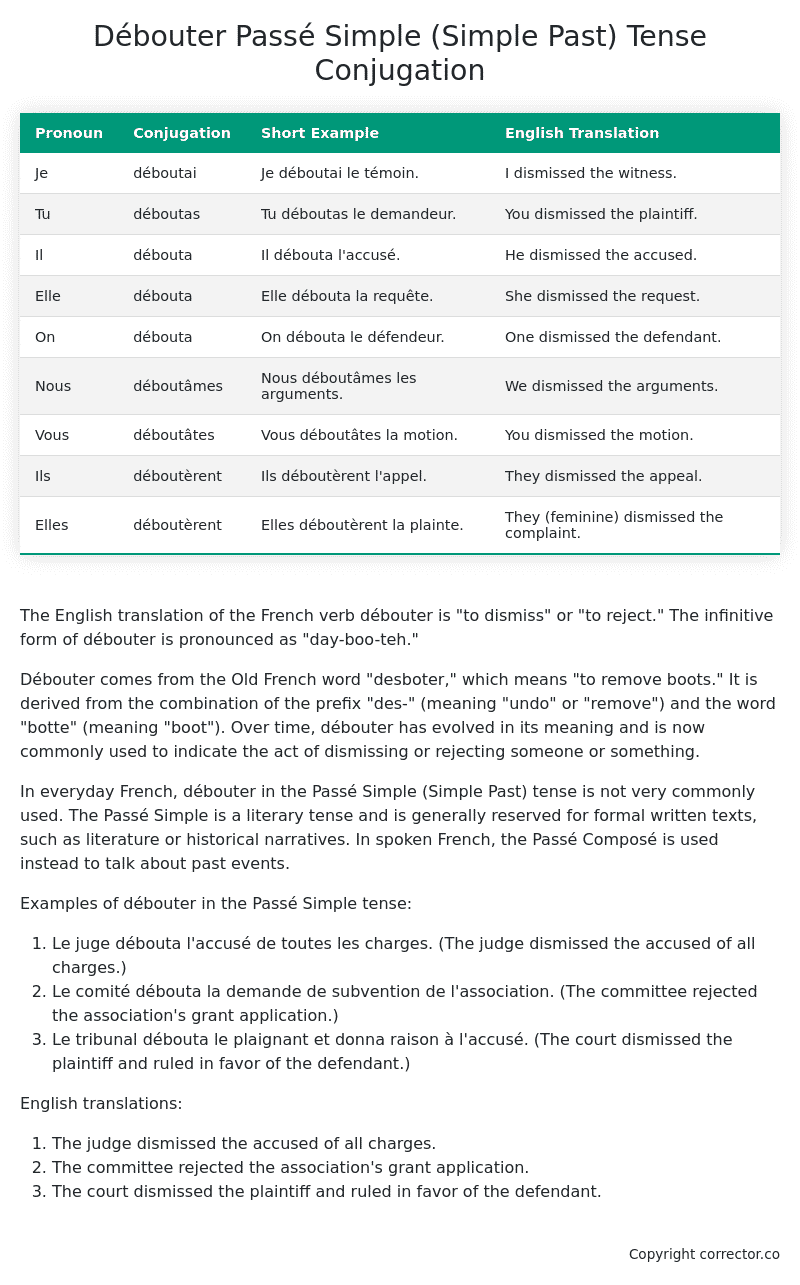Passé Simple (Simple Past) Tense Conjugation of the French Verb débouter
Introduction to the verb débouter
The English translation of the French verb débouter is “to dismiss” or “to reject.” The infinitive form of débouter is pronounced as “day-boo-teh.”
Débouter comes from the Old French word “desboter,” which means “to remove boots.” It is derived from the combination of the prefix “des-” (meaning “undo” or “remove”) and the word “botte” (meaning “boot”). Over time, débouter has evolved in its meaning and is now commonly used to indicate the act of dismissing or rejecting someone or something.
In everyday French, débouter in the Passé Simple (Simple Past) tense is not very commonly used. The Passé Simple is a literary tense and is generally reserved for formal written texts, such as literature or historical narratives. In spoken French, the Passé Composé is used instead to talk about past events.
Examples of débouter in the Passé Simple tense:
- Le juge débouta l’accusé de toutes les charges. (The judge dismissed the accused of all charges.)
- Le comité débouta la demande de subvention de l’association. (The committee rejected the association’s grant application.)
- Le tribunal débouta le plaignant et donna raison à l’accusé. (The court dismissed the plaintiff and ruled in favor of the defendant.)
English translations:
- The judge dismissed the accused of all charges.
- The committee rejected the association’s grant application.
- The court dismissed the plaintiff and ruled in favor of the defendant.
Table of the Passé Simple (Simple Past) Tense Conjugation of débouter
| Pronoun | Conjugation | Short Example | English Translation |
|---|---|---|---|
| Je | déboutai | Je déboutai le témoin. | I dismissed the witness. |
| Tu | déboutas | Tu déboutas le demandeur. | You dismissed the plaintiff. |
| Il | débouta | Il débouta l’accusé. | He dismissed the accused. |
| Elle | débouta | Elle débouta la requête. | She dismissed the request. |
| On | débouta | On débouta le défendeur. | One dismissed the defendant. |
| Nous | déboutâmes | Nous déboutâmes les arguments. | We dismissed the arguments. |
| Vous | déboutâtes | Vous déboutâtes la motion. | You dismissed the motion. |
| Ils | déboutèrent | Ils déboutèrent l’appel. | They dismissed the appeal. |
| Elles | déboutèrent | Elles déboutèrent la plainte. | They (feminine) dismissed the complaint. |
Other Conjugations for Débouter.
Le Present (Present Tense) Conjugation of the French Verb débouter
Imparfait (Imperfect) Tense Conjugation of the French Verb débouter
Passé Simple (Simple Past) Tense Conjugation of the French Verb débouter (You’re reading it right now!)
Passé Composé (Present Perfect) Tense Conjugation of the French Verb débouter
Futur Simple (Simple Future) Tense Conjugation of the French Verb débouter
Futur Proche (Near Future) Tense Conjugation of the French Verb débouter
Plus-que-parfait (Pluperfect) Tense Conjugation of the French Verb débouter
Passé Antérieur (Past Anterior) Tense Conjugation of the French Verb débouter
Futur Antérieur (Future Anterior) Tense Conjugation of the French Verb débouter
Subjonctif Présent (Subjunctive Present) Tense Conjugation of the French Verb débouter
Subjonctif Passé (Subjunctive Past) Tense Conjugation of the French Verb débouter
Subjonctif Imparfait (Subjunctive Imperfect) Tense Conjugation of the French Verb débouter
Subjonctif Plus-que-parfait (Subjunctive Pluperfect) Tense Conjugation of the French Verb débouter
Conditionnel Présent (Conditional Present) Tense Conjugation of the French Verb débouter
Conditionnel Passé (Conditional Past) Tense Conjugation of the French Verb débouter
Conditionnel Passé II (Conditional Past II) Tense Conjugation of the French Verb débouter
L’impératif Présent (Imperative Present) Tense Conjugation of the French Verb débouter
L’impératif Passé (Imperative Past) Tense Conjugation of the French Verb débouter
L’infinitif Présent (Infinitive Present) Tense Conjugation of the French Verb débouter
L’infinitif Passé (Infinitive Past) Tense Conjugation of the French Verb débouter
Le Participe Présent (Present Participle) Tense Conjugation of the French Verb débouter
Le Participe Passé (Past Participle) Tense Conjugation of the French Verb débouter
Struggling with French verbs or the language in general? Why not use our free French Grammar Checker – no registration required!
Get a FREE Download Study Sheet of this Conjugation 🔥
Simply right click the image below, click “save image” and get your free reference for the débouter Passé Simple tense conjugation!

Débouter – About the French Passé Simple (Simple Past) Tense
Formation
Usage
Narration
Historical Context
Interactions with other tenses
Passé Composé
Imparfait
Conditional and Subjunctive
Summary
I hope you enjoyed this article on the verb débouter. Still in a learning mood? Check out another TOTALLY random French verb conjugation!


